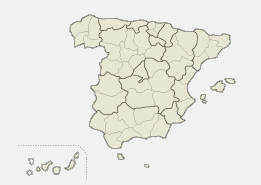- Home
- International Missions
- Afghanistan
- ASPFOR XXVIII
ASPFOR XXVIII
ASPFOR XXVIII is a Spanish military task force composed mainly of troops from 16th Light Infantry Brigade “Canarias”, from Canary Island Command. It will deploy in Afghanistan over the period from late March until mid-April.
During the next five months ASPFOR XXVIII will continue the work undertaken by previous Spanish forces, namely assisting the Afghan government. The objective is to help it exercise and extend its influence over the province of Badghis and provide the stability and security necessary for the reconstruction of the country. Spain has been contributing to this effort since 2002 alongside 47 other countries as part of the NATO-led International Security Assistance Force (ISAF) in Afghanistan, in accordance with UN Security Council Resolution 1386/2001.
ASPFOR XXVIII will have as its main base “Ruy González de Clavijo”, located in the town of Qala-i-Naw, capital of the Badghis province. In addition, the force will have three other bases in the towns of Herat, Ludina and Muqur.
Also deployed in Herat will be the rear echelon of the Logistic Unit, the Helicopter Unit from Agoncillo (Logroño) and the Role 2 Medical Support Unit, to stabilise any possible casualties. The localities of Ludina (Combat Outpost “Bernardo de Gálvez”) and Darrah-i-Bum (Combat Outpost “Hernán Cortés”) will be the force’s spearhead in its aim to expand the security area northwards. A strengthened company-type garrison will be deployed at both sites in coordination with the Afghan army, the US forces at Darrah-i-Bum and a Spanish military mentor team. They will experience the same hardships as local soldiers and police officers, embedded in their ranks and assisting in their training.
The senior staff of ASPFOR XXVIII and the bulk of its troops will be stationed at Qala-i-Naw. Its units include the Manoeuvre Battalion, trained to undertake a great variety of tasks; several mentor and liaison teams working with the Afghan army; and Civil Guard teams, charged with escorting, liaising with, mentoring, training and advising the Afghan police. Also at “Ruy González de Clavijo” will be based a group of highly specialised units crucial for the mission, e.g. Intelligence & Counterintelligence, Logistic Support, Special Operations, Sappers and Signals, alongside Air Force and Marine Infantry teams responsible for reconnaissance, air control and target detection. Finally, a Military Construction team will continue the works and improvements necessary at “Ruy González de Clavijo”.
ASPFOR XXVIII consists of around 1,100 soldiers, of whom nearly a hundred are women; some 840 belong to units based in the Canary Islands (445 come from Tenerife; 230, from Gran Canary; and 165, from Fuerteventura). It is one of the most complete forces Spain has deployed to date in Afghanistan. The great variety and specialization of its units are proof of the effort and determination of the Armed Forces to make sure that Spain fulfils its responsibilities as a member of the international community.
Civil-Military Cooperation Team
It is worth highlighting the deployment of a Civil-Military Cooperation Unit which will undertake a series of Quick Impact Projects devised to directly assist the population by improving their living conditions. Those projects address a wide range of needs, such as water (wells, cisterns, canalisations…), infrastructure (fixing roads, walls, schools…); energy (solar panels); health (medical supplies, refurbishment of health clinics); and humanitarian aid (delivery of food, clothing, shoes and toys). These actions are identified by the personnel of the CIMIC Unit, then the colonel who leads the Provincial Reconstruction Team presents a plan to Operations Command. Once the project is approved, locals are hired to carry it out in order to further extend its benefit.
The activities of the CIMIC Unit also include coordinating Spanish lessons for the local population of Qala-i-Naw. The lessons are currently attended by over 120 children and young people of both sexes.
In addition, the civilian component of the PRT at the main base in Qala-i-Naw is supported by personnel from the Spanish Agency for International Development Cooperation (AECID), which is under the authority of the Spanish Ministry of Foreign Affairs. Their task is to develop long-term projects with a significant social and economic impact for the Badghis province in areas such as infrastructures, water and sanitation, health, education, agriculture and animal husbandry.
Challenges facing ASPFOR XXVIII
The objectives to be achieved include:
- Expanding the security zone within their area of responsibility by consolidating the Opal route which links Qala-i-Naw and Darrah-i-Bum; extending the security bubble over the latter and over the Lithium route to the town of Mangan.
- Easing the deployment of an Afghan Army brigade within its area of responsibility, providing it with Spanish mentor teams (OMLTs) and carrying out joint security operations.
- Increasing support to the governability of the Badghis province through the development programmes already underway, especially the reintegration of former insurgents – a pilot programme expected to be extended to the whole of Afghanistan.
The Canary Islands in Afghanistan
The Canary Islands have so far contributed three task forces to the NATO-led International Security Assistance Force mission in Afghanistan – i.e. roughly 10% of the Spanish contribution to the Asian country.
The first of those, ASPFOR XVIII, was created in 2007 with troops from the 50th Light Infantry Regiment “Canarias”. Its main base and, therefore, HQ of the Provincial Reconstruction Team was at Qala-i-Naw. It also maintained in Herat a Company from the 49th Light infantry Regiment “Tenerife” as Quick Reaction Force and a National Support Element with troops from the 81st Logistic Support Group.
The second Task Force created in the Canary Islands was ASPFOR XXIII, with troops from the 9th Light Infantry Regiment “Soria”. Like the previous force, its main base was in the town of Qala-i-Naw. During its 2009 mission the task force kept an Election Support Battalion at Qala-i-Naw with personnel from 49th Light Infantry Regiment “Tenerife”. On this occasion, the force included a Quick Reaction Force Battalion made up of troops from 9th Light Infantry Regiment “Soria” and a National Support Element with troops from the 81st Logistic Support Group, both based in Herat.
As for ASPFOR XXVIII, which will carry out its deployment in Afghanistan at the end of March and over the month of April, its core troops come from the 49th Infantry Regiment “Tenerife”. As in previous occasions, its main base will be at Qala-i-Naw, alongside the Provincial Reconstruction Team, the Protection and Security Unit, the Manoeuvre Battalion and the Logistics Unit, whose troops come from the 81st Logistic Support Group. Furthermore, the Logistic Unit will also maintain a detachment in the town of Herat.
ARMY UNITS
- Araba Álava |
- Albacete |
- Alicante |
- Almería |
- Asturias |
- Ávila |
- Badajoz |
- Barcelona |
- Burgos |
- Cáceres |
- Cádiz |
- Cantabria |
- Castellón |
- Ceuta |
- Ciudad Real |
- Córdoba |
- A Coruña |
- Cuenca |
- Girona |
- Granada |
- Guadalajara |
- Gipuzkoa |
- Huelva |
- Huesca |
- Islas Baleares |
- Jaén |
- León |
- Lleida |
- Lugo |
- Madrid |
- Málaga |
- Melilla |
- Murcia |
- Navarra |
- Ourense |
- Palencia |
- Las Palmas |
- Pontevedra |
- La Rioja |
- Salamanca |
- Segovia |
- Sevilla |
- Soria |
- Tarragona |
- Santa Cruz de Tenerife |
- Teruel |
- Toledo |
- Valencia |
- Valladolid |
- Bizkaia |
- Zamora |
- Zaragoza



